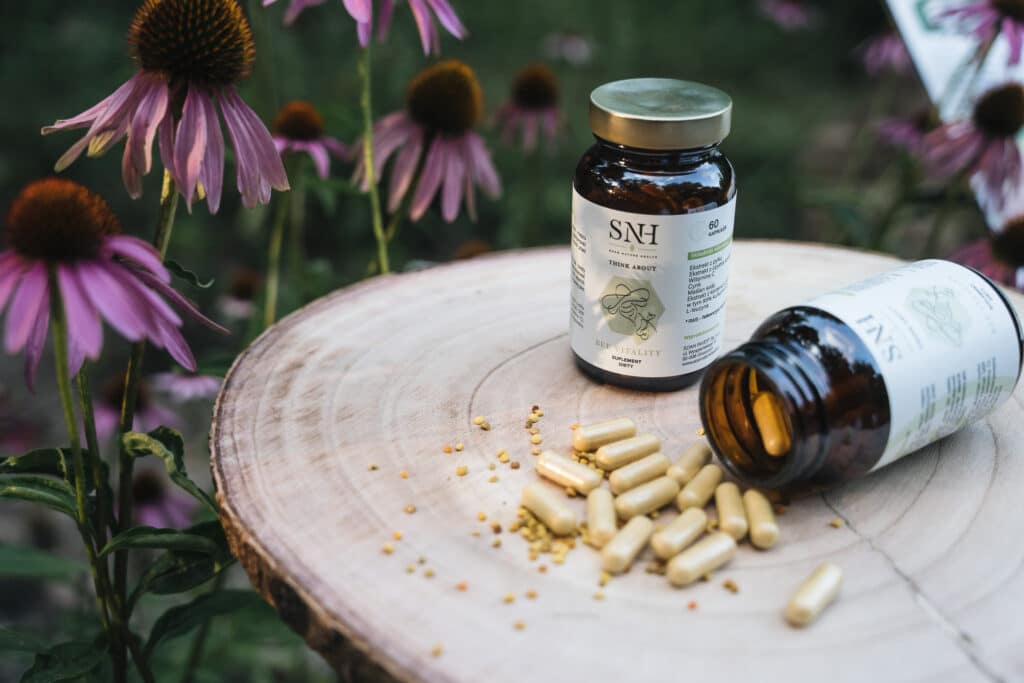It turns out that it is, and it has its source in the invaluable work of bees.
Bee Vitality is a synergy of standardized extracts of bee pollen, rockrose, zinc, turmeric, vitamin C, and butyric acid. A natural, pure formula without unnecessary additives, a vegan capsule, and microbiological and heavy metal testing for each batch are hallmarks of the highest quality raw materials and production safety.

How do the ingredients in Bee Vitality affect insulin resistance?
The key ingredient in this formula is bee pollen. It is a source of flavonoids, phytosterols, as well as vitamins, minerals, specialized proteins, and numerous biologically active compounds. Thanks to this natural combination, it has strong anti-inflammatory, antibacterial, antiviral, hypoglycemic, and antiatherosclerotic properties, supporting the elimination of free radicals. It is also recommended during convalescence and as a supportive treatment for states of low mood and psychophysical exhaustion. When taken regularly, it has adaptogenic properties, meaning it demonstrates the body's ability to adapt to unfavorable environmental changes, such as stress, emotional tension, and their associated effects.
As is well known, the severity of insulin resistance is strongly correlated with the severity of inflammation, and these two intertwined factors constitute a vicious circle. Striving to reduce and eliminate inflammation is a way to interrupt it and allow tissues to regain insulin sensitivity. Adaptogenic effects, such as increased exercise tolerance, improved immunity, and improved cognitive function, appear to be particularly useful in the context of lifestyle changes necessary for comprehensive insulin resistance therapy.
Among the most interesting, easily digestible components of bee pollen are phospholipids such as lecithin, cephalin, and naturally occurring myo-inositol. These are particularly valuable for their lipotropic properties, meaning they prevent fatty liver and the proliferation of atherosclerotic plaque. Myo-inositol, on the other hand, is widely known for its ability to improve tissue sensitivity to insulin and is widely recommended in the treatment of insulin resistance and as a supportive treatment for PCOS.
Zinc is a crucial element in glycemic control and insulin sensitivity. Its primary role in insulin resistance is the synthesis, storage, and action of insulin in tissues. A daily serving of Bee Vitality contains 15 mg of the easily absorbed form – zinc gluconate, which constitutes the adult's daily requirement of 1501 TP3T.
The content of turmeric extract, standardized for curcuminoid content, is also significant. Curcumin, the biologically active component of turmeric, has been shown to have a beneficial effect on glycemic control, insulin secretion, lower triglyceride levels, and exhibit strong anti-inflammatory properties.
Standardized rockrose extract is a source of valuable polyphenols, including ellagitannins, which have strong anti-inflammatory potential. It's also worth mentioning the ability of rockrose extract to inhibit α-glucosidase, an enzyme that breaks down starch into glucose molecules. By inhibiting α-glucosidase, carbohydrates from meals are broken down more slowly, contributing to lower postprandial blood glucose levels.
The experiences of people struggling with insulin resistance point to the common problem of digestive discomfort. Increased inflammation, uncontrolled blood glucose levels, insulin spikes, and other typical symptoms impact the gut microbiome, manifesting itself in the aforementioned digestive difficulties. A change in the composition of the microbiota can impair the secretion of short-chain fatty acids, an important product of bacterial fermentation. These acids protect the integrity and tightness of the intestinal barrier, nourish the intestinal epithelium, and protect against the development of pathogenic strains. The addition of sodium butyrate in Bee Vitality, as one of the short-chain fatty acids naturally produced by the microbiome, is intended to replenish potential deficiencies and alleviate digestive discomfort.
In summary, the ingredients in Bee Vitality not only contribute to reducing the negative effects of insulin resistance but also demonstrate beneficial effects in reducing the factors that cause and maintain tissue resistance to insulin. A daily dose of Bee Vitality is one capsule, and one pack provides two months of supplementation.
Bibliography:
The author of this entry is:
